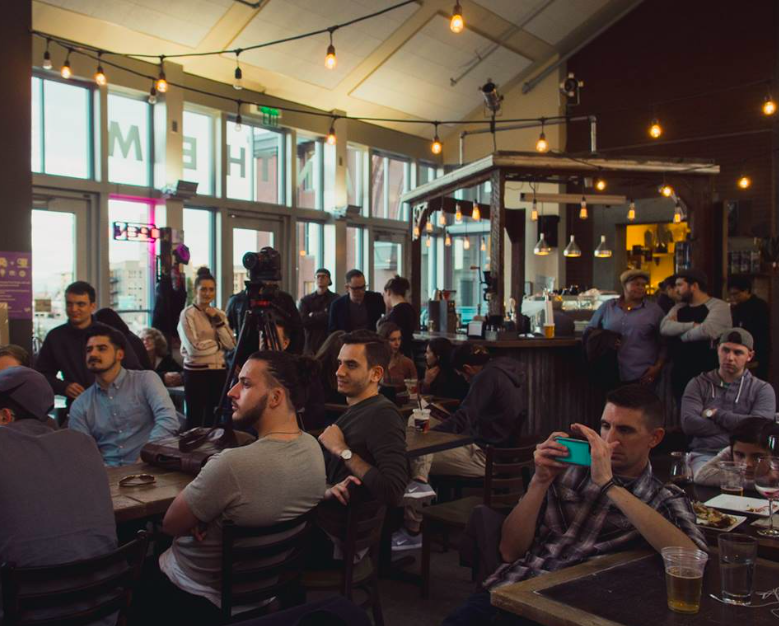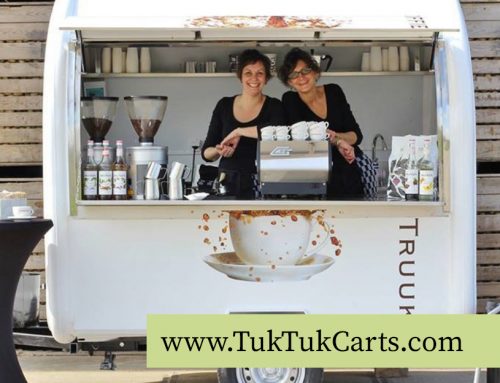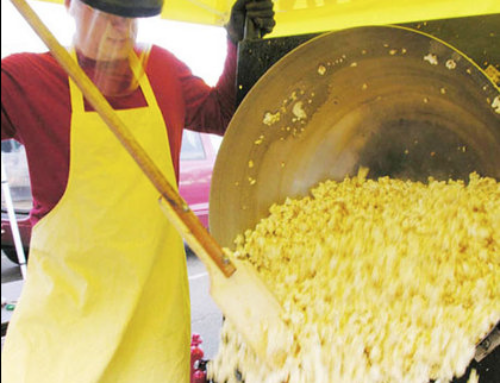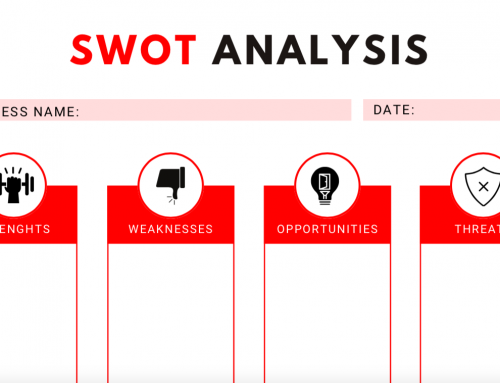Podcast: Play in new window | Download | Embed
Subscribe: RSS
Andrew and Claire Bowen are on a mission to stop independent coffee shops from failing.
While employed in the healthcare and retail sectors, Andrew and Claire Bowen got the idea to start a coffee shop. Andrew, who regularly traveled during his career, developed an appreciation for local coffee shops during these frequent business trips. The more Andrew visited and worked out of these coffee shops, the appreciation for these business continued to grow.
After bringing up the idea of starting a coffee shop to his wife Claire, the couple completed their due diligence and determined the business model could be profitable. As a personal benefit, operating a coffee shop would also allow the couple to spend more time together. A win-win!

Today’s Guests: Andrew and Claire Bowen.
In 2007, the couple made the leap and took over their first franchise coffee shop. From that point, success and growth came fast for the husband and wife team. Within 18 months, the couple opened three locations and generated over $1 million pounds in top-line revenue. In 2011, the couple developed and launched their first independent coffee shop concept they continue to run today.
More recently the couple set out to support coffee shop owners worldwide through their website CoffeeSuccessHub.com and their Amazon best seller “The Daily Grind – How to Open & Run a Shop that Makes Money.”
By the way if you’re interested in winning one of five free copies of The Daily Grind book you can register for a chance to win a copy when you enroll for the free Coffee Shop Startup Kit or by sharing this post on Facebook. Do both and you’ll get two entries to win.
It’s a nice business, full of nice people. – Andrew Bowen on operating a coffee shop.
Taking Over an Existing Coffee Shop
For the first location, Andrew and Claire purchased an existing franchise coffee shop. The shop was positioned in a quality location, but the previous owner had lost interest in the business. As a result, the employees were left to manage the business without any rules or processes put in place. After purchasing the coffee shop, the couple went full steam ahead into improving the operations of the business.
The first step in the turn-around process was to document and improve the standard operating procedure inside the coffee shop. After establishing clear processes, the staff bought into the new vision of the company. The Bowens would also work to create a better overall working environment for their staff that made employees more satisfied. During this time period, all aspects of the business were looked at and improved by the couple.

Two Common Reasons that Coffee Shops Fail
There are many reasons that a reported 80% of coffee shops fail, but here are the two big ones.
In any type of small business, location is critical for success. Many would-be successful coffee shops open in a location that sets them up for failure early on. Too many coffee shop owners end up paying too high of rent to ever be successful based on the amount of traffic volume going by their shop.
On the flip side, other shops start too small. The thinking is logical: You might want to start small in a lower rent location where you don’t need as much traffic to be profitable. But it usually doesn’t work out that way.
If you’re opening in a small site with under 40 seats or limited drive-thru business, you’re essentially buying yourself a job by limiting the income potential. You’ll never be able to generate enough revenue to hire a manager to run the day to day. Depending on your goals for the business, this situation may not be ideal.
Everyone thinks they can run a coffee shop because they sit in it all the time and think it’s easy. It’s not easy. – Andrew Bowen
How To Find and Hire the Best Coffee Shop Employees.
Hiring the right team to run your business is a key factor in operating a coffee shop. When looking for those critical first employees, the Bowen’s recommend hiring for hospitality and customer service as the most important skill a person can have.

The Daily Grind is Available on Amazon.com.
You can teach someone how to make a really good latte. It’s more difficult to train on soft skills like a welcoming smile, eye contact, and conversational prowess that delivers the one-of-a-kind experience and keeps customers coming back. These are the intangibles that can’t be trained. You’ve either got it or you don’t.
After you’ve found someone that’s a good fit. The next step is to train these new baristas and employees to your standards for working at a coffee shop. From serving coffee to cleaning equipment or how to deal with a challenging customer, no detail is too small to train on.
Here’s one you might not have thought about. It’s critical to share your coffee shop story with new hires. Every independent coffee shop has a wonderful and unique story. But the same story needs to be told by all staff members for this to come across to customers. Understanding the coffee shops back story will also help employees buy in on their roles.
Become a Magnet and Attract The Best Hospitality Talent in Your Market

Become a Magnet for Top Talent in Your Area.
When you become an established coffee shop in your city, it becomes easier to recruit the best baristas and managers. One of your goals as a business owner is to turn your business into a magnet for high performers that want to work in the best establishments.
The services of high-performing bartenders, baristas, or waiters are always in demand. If you’re able to create an environment that people are proud to work in, can have some fun, and make good money, word will spread within the local hospitality community.
Not surprisingly these rock star employees don’t want to work in a dive or be disrespected at work. These sorts of people won’t be working in a poor work environment for very long. They’ve got plenty of options.
The Bowen’s have spent years operating their own business and helping others improve their own coffee shops. Based on their experience, the thing biggest factor determining the success or failure of a business is having the right people in place. To get the right people, you must put effort into becoming a magnet for top talent.
Here are some specific things you can do to create a better working environment in a coffee shop and attract super start employees:
Working Conditions: It should go without saying that having high-quality working conditions is super important for attracting the best of the best. This means maintaining a clean coffee shop that is welcoming.
Make sure the temperature isn’t too hot or cold for baristas. This is not an area to try to cut costs on heating or cooling bills!
Provide Schedule Flexibility: Your employees will have family or school obligations they need to attend to. Try to do whatever you can to provide flexible working options for people. Top performing people can have lives and goals outside of your shop. By offering more scheduling flexibility, you’ll be able to set yourself apart from other employers in your area.
We also want to point out that none of the points above has anything to do with money or paying more. While money is important, it’s not the only thing that drives employees.
Who Should Be the First Hire in a New Coffee Shop?
At this point, you understand the need to compile a super team if want to become one of the best coffee shops in your area. But you can’t build a team without that critical first hire. So what role should you attempt to fill first?
Depending on the size of coffee shop and your personal goals for the business will determine that important first hire. If the goal is to have a self-run coffee shop that you plan manage then by all means hire a barista to help prepare beverages and serve customers. This is a perfectly fine approach if you want to do everything yourself but it’s more like buying a full-time job for yourself versus operating a business with growth potential.
On the other hand if you hope to build a business that you could eventually sell or step away from at some point, The Bowen’s recommend hiring a store manager or someone with the potential to be a manager first. The individual you hire doesn’t have to have all the skill right away, but they do need a desire to learn and grow.
Hiring a manager first allows you to share the vision, build processes and make hiring decisions in the early days. This individual is someone that should take some of the burden off you. This person should have problem solving skills and a can do attitude with an ability to figure things out.
In the ideal scenario, you would hire someone that have a vision of starting their own coffee shop in the next 4 – 5 years. You know that these people will be serious about how they approach the operations of the business.
You’ll also want this new hire to have a complimentary skill set to you. This person should need to fill in the gaps where you may not have expertise. For example, if you’re good with numbers and accounting don’t look to hire someone with those same skills. Find someone with talents for building relationships and marketing instead. You should seek to fill in your weaknesses instead of bringing onboard people that think and act the same way you do.
So before you start hiring do some soul searching of your own first to figure out what you’re good at: Operations, Finance, Customer Service, or People Management. Then try to find someone with the complimentary skill set that will help grow your business.
How Many Employees Will You Need to Hire?
After you find a manager, it’s time to put together a supporting cast of team members. For a small coffee shop, starting out 8 – 9 team members is about average.
This may seem like a lot of employees hire, but remember that most of your employees will be part-time. Your store manager may be the only full-time staff member and that is fine. You will need enough staff to be able to support people taking days off, getting sick, going on vacations, and finding other jobs.

How Train Baristas and Staff For Success
One of the secrets to operating a well run coffee shop is to train people well and continue training individuals throughout their life of their employment.
Everything you do in your coffee house must have a system or process written down for employees to follow.
There should be a specific recipe and way to serve the simplest food item such as a pre-made muffin. There must be a standard process for cleaning bathrooms and dining areas.
In addition to providing clear instructions to staff, clear guidelines improves your overall customer service. A major element of customer service is consistency. People like to know what type of experience they’ll have at an establishment and if the coffee doesn’t taste the same each time or the food isn’t prepared in the same way every time that’s a problem.
Everything must be documented so your employees understand what they need to do and how to accomplish the tasks in a way that meets expectations.
The Hiring Process for Coffee House
It can be really hard to figure out the quality employees from the poor ones during an interview process. Someone that answers a set of standardized questions to perfection does not a great manager or barista make. As a result, the Bowens developed a few of their own tools that you can build into your own coffee shop business when hiring:
One smart test the Bowens have used to find out if a prospective employee can keep up with the often frantic pace of working in a coffee shop is to ask prospective employees to follow him up the stairs and stay close behind. If the prospect was still at the bottom of the stair case at the time he reached the top then working at a fast paced coffee shop may not be a suitable job type for that individual.
Another approach used is implementing a 90-day trial period for all new staff. No matter how sophisticate your approach to hiring is you don’t truly know if an individual will be successful until they start work. After the 90-day trial period, both the employer and the employee should have a clear understanding of whether or not this is the right fit. Making this an understanding up front also sets the tone with new employees that you’ve got to be willing to work to remain gainfully employed for long.
On-Going Feedback is Important for Employees
You must be continually giving appraisals to your employees. Giving feedback does not mean you’re being mean or nasty. In fact, for many of these appraisals you’ll be providing compliments encouraging employees to keep up the good work!
Often times managers can get into the habit of only identifying things that must be improved upon. Being able to spot improvement opportunities is an important element of a quality manager, but don’t forget all the good things happening every day in your business too!
When it comes time to adjust or improve on employee behavior, offer the feedback in a positive way. One good approach is the provide praise to an employee then offer a feedback and finally end the conversation with another compliment. This approach can help everyone feel good about what can be a difficult conversation. Always make sure to affirm that the employee is valued any time you provide constructive criticism.
Finally, it’s totally normal for coffee shop owners, especially if they’ve escaped stuffy corporate environments to forget about on-going training and feedback of employees.
After all, a regimented approach to work and communication may have been one of the catalysts for starting a business. However, if you want the business to be successful, a formal commitment to improving and developing team members is essential. Listen to the full podcast interview for all the details on ways to improve the hiring process for your coffee house.
What You’ll Learn:
- Why the couple decided to take over an existing franchise coffee shop for their first location.
- How the couple was able to double the revenue of their within their first month of ownership.
- The importance of carrying around a notebook to write down your ideas or thoughts about your business.
- Why you’re really in the hospitality business as a coffee shop owner.
- The importance of hiring employees with the hospitality gene. Other desirable traits and skills can be taught.
- The importance of understanding the reasons why you want to start a coffee shop.
- Some of the most common reasons coffee shops fail and how to avoid them.
- Who the first hire should be inside of your business. Why you should aim to hire someone with management potential first.
- How to build a strong team. Why you should look for people with complimentary skill sets to yours.
- Finding your coffee shops story. The importance of creating an environment that people are proud to work at.
- Learn about the 12-week training / evaluation process that new team members go through within Andrew and Claire’s shops.
- Why you should take the time to work at a coffee shop before you decide to invest in a coffee shop yourself to get clarity if it’s the right choice for your situation.
Part of the reason we wrote the book is that we’ve seen so many people like us try to open a coffee shop and think it’s a great little lifestyle business. Then in 18 months – 2 years lose a load of money and retreat with their tail between their legs. – Andrew Bowen on coffee shop startups.
You can teach someone to make a fabulous cup of coffee, but you can’t teach the hospitality gene. – Claire Bowen on hiring team members.
Mentioned in The Episode:
Cafe Success Hub: Educational website and blog published by today’s guests Andrew and Claire Bowen. Here you’ll find a variety of helpful resources for coffee shop owners, including a business start-up calculator, informative blog posts, and an Ask Us Anything section where you can get answers to business questions.
The Daily Grind: This guide, written by Andrew and Claire Bowen, takes you through the steps required open and run a profitable coffee shop. If you’re going to be investing a hundred thousand dollars (or more) into starting a coffee shop, it would be wise invest less than $20 to understand what it takes to operate this business successfully. This Amazon best seller is the type of publication you’ll want to take notes with, highlight, and return to often for guidance during the startup phase of your business.
Coffee Business Owner Group: Shout out to this private Facebook group. You can apply for free access by clicking the link. If you are an owner of a coffee business or are thinking of starting a coffee business, this is a fantastic and active online community where lots of world-class entrepreneurs hang out. I was able to connect with Andrew and Claire Bowen inside of this group to schedule today’s interview. This group is managed as a service to the coffee community by Espresso Outlet as a labor of love.
Coffee Shop Startup Cost Calculator – Free tool you can use to estimate the startup costs of your future coffee shop.




